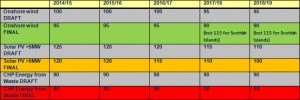The Department of Energy and Climate Change (“DECC”) today published final strike prices representing the level of income in £/MWh hour that new renewable generating plant will be guaranteed to achieve under Electricity Market Reform (“EMR”) Contracts for Difference (“CfDs”). We compare the final prices with the draft strike prices consulted on in July for selected technologies below.
Technologies with higher final strike prices included Biomass with CHP (up £5 to £125 for all five years), Anaerobic Digestion and Geothermal. Landfill Gas, Sewage Gas and Hydro all ended up with lower final strike prices. The prices proposed for Biomass Conversions, Wave and Tidal Stream projects have not changed, and those for Offshore Wind have only changed for 2018/19 (down £5 to £135).
It is hard to avoid the conclusion that some of the changes are intended to have a political resonance. Reduced subsidies for onshore wind and solar PV should mean fewer locally unpopular wind and solar farms, at least in areas where the weather makes the business case highly sensitive to subsidy levels.
But whether you think you are a winner or a loser, the strike price story is not over yet. DECC will have a lot of flexibility in terms of writing – and re-writing – the rules for each CfD allocation round, and today’s publication includes strong hints that some or all of these “administratively set” strike prices could be swept away and replaced by a system of competitive bidding sooner rather than later, perhaps as part of the price for persuading the European Commission to approve the state aid aspects of EMR.


